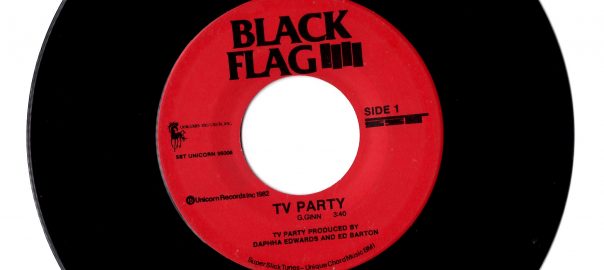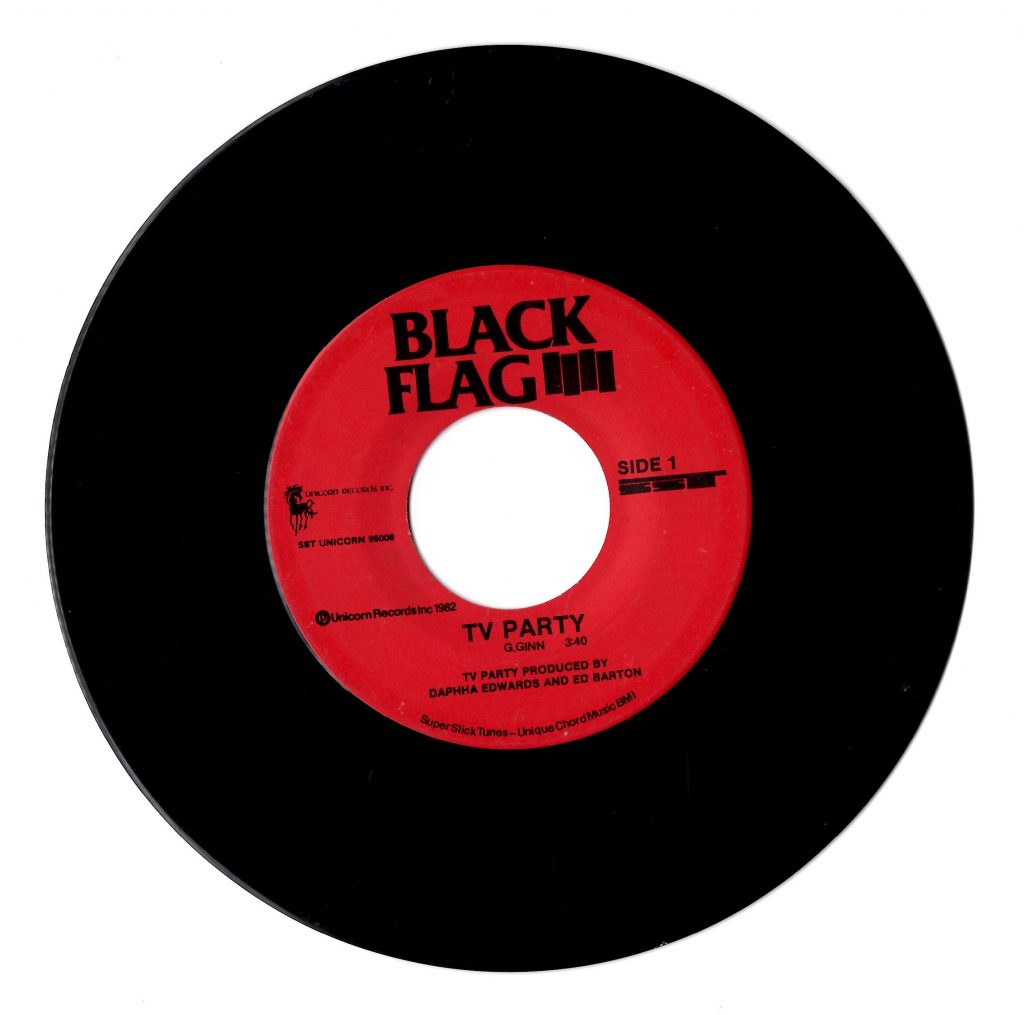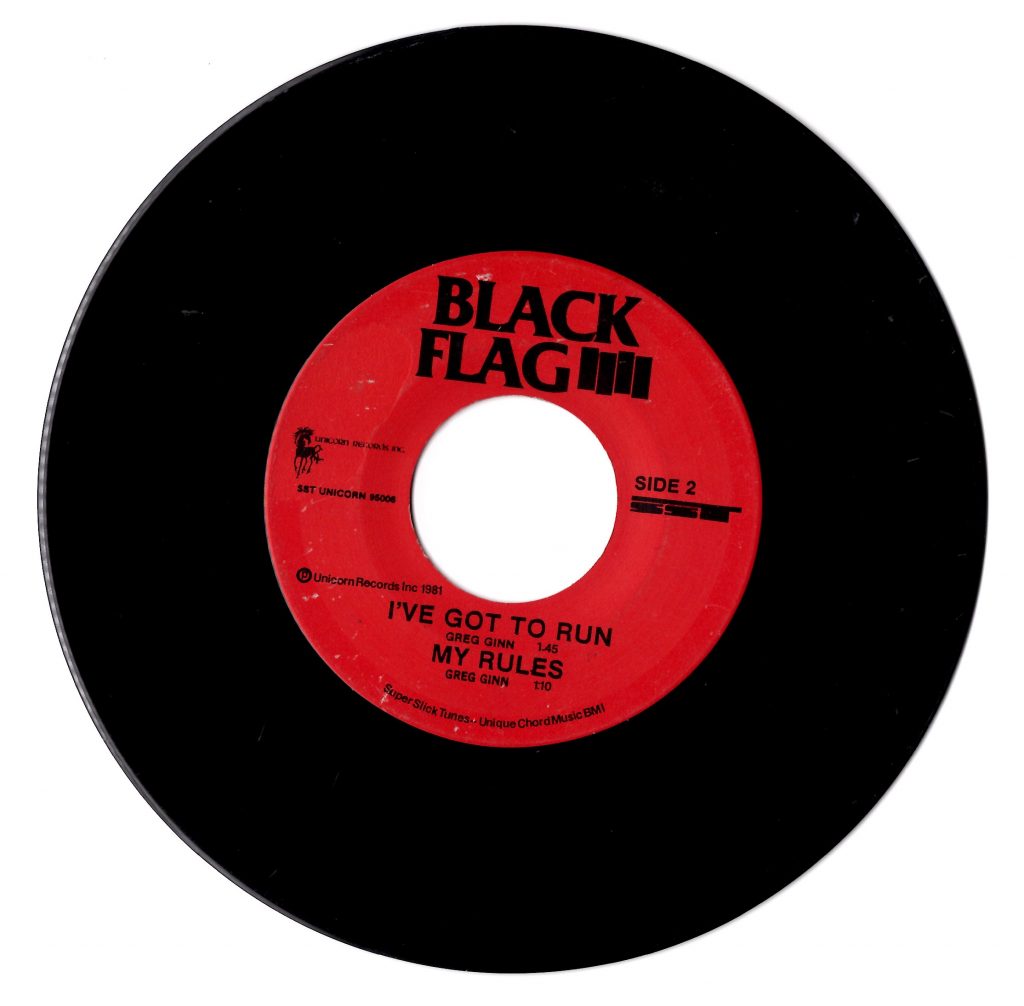Format: 7″ single
Notes: I *think* this is an original pressing due to the Unicorn logo. There was such bad blood with Unicorn that SST would never willingly put out a record with Unicorn’s name or logo on a repress, but maybe this is a bootleg. IDK. IDC. My copy is barely playable and the original art is long gone.
However, I find it interesting that Side 1 with “TV Party,” which was recorded in 1982 with Black Flag’s third drummer, Emil Johnson, was recorded after Side 2 with “I’ve Got to Run” and “My Rules” in 1981 with Black Flag’s fifth drummer, Bill Stevenson.
Confused? Read on…
[The following appeared in the Sellout Edition of PssSST!]
You know who knows something about selling out? Henry Rollins, that’s who. That sounds like a set-up for a put-down but I promise you that it isn’t. I think Henry Rollins is one of the most fascinating writers of my generation.
Henry Rollins has been called a sellout pretty much his entire career. Everyone knows that before Rollins was Rollins he played in the band State of Alert prior to joining Black Flag. When he played Washington, DC, with his new band for the first time, his old friends in the scene called him a rock star and a sellout, which affected him deeply. Here’s what he had to say about it in Get in the Van:
“I learned something that night that stuck with me. I got shit from some of the people I thought were my friends. They told me that I had become some kind of a rockstar. The fact that I left Washington DC and came back in this “big” band was a sell out. Some people I knew treated me strange. It hurt at first, then I realized something. You’re going to do what you’re going to do and that’s all there is. That’s all you got and that’s that. From that night on I figured they can go get fucked.”
This is the Rollins I love. Vulnerable, reflective, assertive. He uses his intellect to protect his feelings and forge a new way of being in the world. This is a place that some people struggle to reach all their lives. The entry is dated December 3, 1981, nearly forty years ago. Rollins was 19.
When Rollins was in SOA, he had a job as a manager of an ice cream store, an apartment, a bank account, and a record player with a record collection, but he gave up all of those things to be in Black Flag. The band’s bare bones touring operation is the stuff of legend, largely because of Rollin’s diaries from those days, but the conditions at SST HQ weren’t much better. It was a vagabond existence where things like shelter, food, clothing, heat, etc.—things Rollins had taken for granted—had to be negotiated almost every single day.
The life he led as a member of SOA was cushy compared to his life in Black Flag, and yet Rollins was a rock star? No, Rollins sacrificed everything to be in Black Flag. The sellout wars are battles of perception and Rollins learned earlier than most that it’s a war you cannot win. The things you do matter. The things others say do not.
Rollins wasn’t the only one who was accused of selling out. After Black Flag released “TV Party” Ginn was asked by We Got Power if the band had sold out. This question was a bit thornier because of Black Flag’s entanglement with Unicorn, a label with a distribution deal with MCA. The song, which Black Flag re-recorded for the single, was co-produced by people attached to Unicorn, such as Daphna Edwards, who ran the label, and Ed Barton, who’d worked on many of War’s hits. The single’s lyrics differ slightly from the version recorded for Damaged, mainly to update the TV shows and schedules referenced in the song. (When Dallas moved from Friday to Wednesday night, Black Flag was on it!)
But the reason why people thought Black Flag was selling out with “TV Party” had nothing to do with Unicorn’s major label affiliation and everything to do with the way it sounded. The song is humorous and references pop culture. Also, there’s a clap track, which is always weird. When a punk band puts a clap track in a song it’s fair game to ask, “What were you thinking?”
“I think TV Party is hilarious,” Ginn told We Got Power. “And if we would not do it because we might think we might get some criticism, that would be selling out, rather than saying, ‘Well, we’re gonna do what we like.’
But the questions about selling out kept coming. Rollins came to despise doing interviews. He hated the way fanzine interviews were stripped of context or magazine articles always had an agenda. He just wanted to say what was on his mind, but doing interviews made him feel like he was selling himself out.
Is it any wonder he threw himself into spoken word? Rollins’s “talking shows” provided a platform for Rollins to tell stories in his own way without editorial oversight. He could write his books and go on tour and he didn’t have to answer questions about selling out ever again.
And then this happened.

This post originally appeared in a slightly different form at Message from the Underworld.


